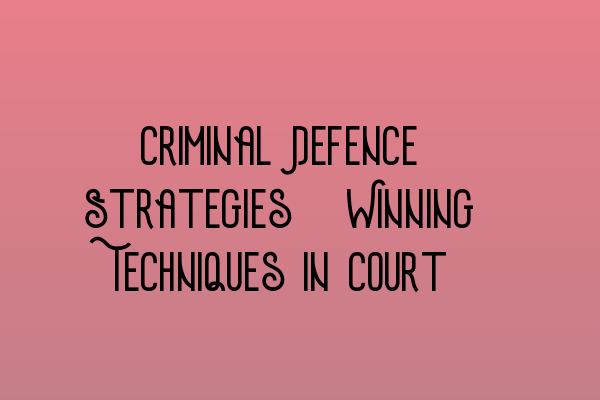Criminal Defence Strategies: Winning Techniques in Court
When it comes to criminal defence cases, the strategies implemented can make all the difference in achieving a positive outcome. In this article, we will explore some winning techniques that can be used in court to defend individuals facing criminal charges.
1. Preparing a Solid Defense
A successful criminal defence starts with thorough preparation. The defence team must conduct a detailed analysis of the case, assess the evidence, and identify any weaknesses in the prosecution’s case. SQE 1 Practice Exam Questions can help lawyers sharpen their analytical skills and knowledge of criminal law.
2. Investigating the Facts
One of the most crucial aspects of building a strong defence is conducting a comprehensive investigation. This involves gathering evidence, interviewing witnesses, and uncovering any information that may support the defendant’s innocence. Understanding how to conduct effective investigations can be learned through SQE 1 Practice Mocks FLK1 FLK2 to strengthen a lawyer’s skills in criminal defence.
3. Challenging the Prosecution’s Case
To mount a successful defence in court, it is important to challenge the prosecution’s case at every turn. This may involve discrediting witnesses, questioning the admissibility of evidence, or highlighting any inconsistencies or gaps in the prosecution’s narrative. SQE 2 Preparation Courses can equip lawyers with the necessary knowledge and skills to effectively challenge the prosecution.
4. Utilizing Legal Defenses
There are several legal defenses that can be utilized depending on the circumstances of the case. These include self-defense, alibi, entrapment, and insanity plea, among others. Familiarizing oneself with various legal defenses through SQE 1 Preparation Courses can help lawyers identify the most appropriate defense strategy for their clients.
5. Building a Persuasive Argument
In court, a persuasive argument can sway the judge and jury in favor of the defendant. This involves constructing a logical and compelling narrative that challenges the prosecution’s version of events. Lawyers can enhance their advocacy skills through effective writing and public speaking techniques.
In conclusion, implementing winning strategies in criminal defence cases is essential for achieving positive outcomes. By preparing a solid defense, investigating the facts thoroughly, challenging the prosecution at every turn, utilizing legal defenses, and building a persuasive argument, lawyers can significantly increase their chances of success.
For more information on the SQE exams and preparation, you can refer to the following articles:
- SQE 1 Practice Exam Questions
- SQE 1 Practice Mocks FLK1 FLK2
- SQE 2 Preparation Courses
- SQE 1 Preparation Courses
- SRA SQE Exam Dates
